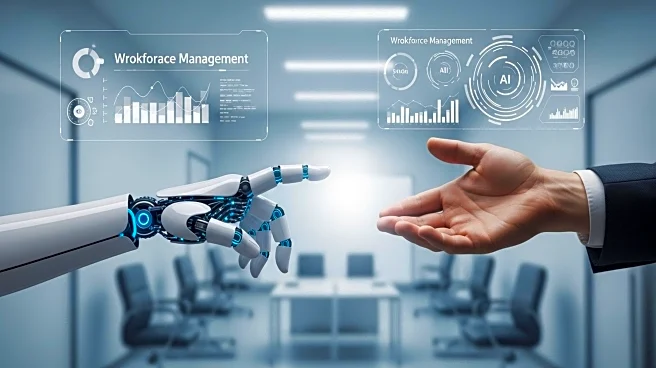What's Happening?
SAP has introduced a new AI strategy aimed at transforming human resources management by fostering a partnership between humans and AI. During the Connect conference in Las Vegas, SAP executives emphasized that AI should be seen as a collaborative tool rather than a threat to jobs. Gina Vargiu-Breuer, SAP's Chief People Officer, highlighted the importance of skills in the digital age, likening them to a 'new supply chain' essential for workforce planning and development. The company announced the rollout of role-specific AI assistants designed to alleviate administrative tasks, allowing HR leaders to focus on strategic initiatives. SAP's approach aims to accelerate adaptability and growth by dynamically adjusting skill requirements through its SuccessFactors platform.
Why It's Important?
The introduction of AI in HR by SAP signifies a shift in how organizations manage their workforce, emphasizing the need for a skills-first approach. This strategy is crucial as it addresses the rapid changes in skill requirements, with technical skills having a shelf life of only 18 to 36 months. By automating specific tasks rather than entire jobs, AI creates new opportunities for employees to expand their roles and adapt to evolving demands. The partnership between humans and AI is expected to enhance productivity, with industries exposed to AI already experiencing significant growth. For HR leaders, this means more time for strategic planning and fostering a culture that attracts and retains talent.
What's Next?
SAP's strategy suggests a future where HR leaders will focus more on designing work rather than performing it, with AI handling routine tasks. Organizations are encouraged to invest in cultures that promote experimentation and adaptability, preparing for a decade where the ability to unlearn and relearn will be vital. SAP's AI assistants, such as Joule, are set to become integral in workforce planning, recruiting, and HR operations, providing personalized support to leaders. As AI adoption continues, businesses will likely see increased productivity and strategic value, prompting further integration of AI tools in HR practices.
Beyond the Headlines
The ethical implications of AI in HR revolve around ensuring that technology enhances rather than replaces human roles. SAP's emphasis on culture as a determining factor highlights the need for organizations to foster environments that support growth and inclusion. The shift towards a skills-first approach may redefine job architectures, learning, and development, potentially leading to a more dynamic and resilient workforce. As AI becomes pivotal to SAP's success, the long-term impact may include a transformation in how organizations view and utilize human capital.











